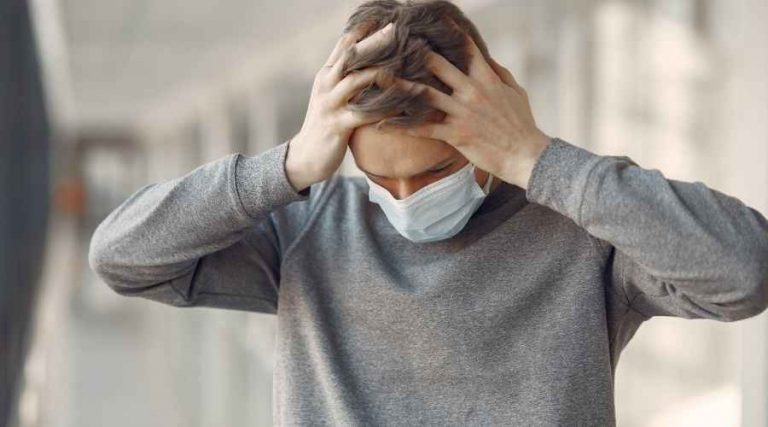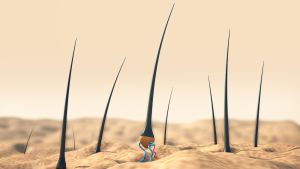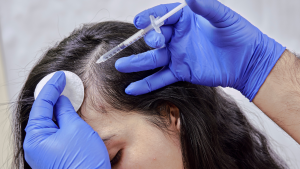Long-term or chronic stress can lead to several health problems in people. The symptoms can include anxiety, and depression leading to problems with digestion and sleep. Although hair loss has always been closely associated with stress, the reasons weren’t entirely clear.
Types of Stress-Related Hair Loss
Three types of hair loss can be linked to high-stress levels.
Telogen Effluvium (TE)
TE occurs when there is a change in the number of hair follicles that are growing hair. When this change occurs during the resting phase of hair growth, it can lead to shedding. Major stress can push a large number of hair follicles into a resting phase. The affected hair might fall out when washing or combing your hair within a few months. The hair loss resulting from TE is fully reversible as it doesn’t permanently harm the hair follicles.
Trichotillomania
Trichotillomania is known as a hair-pulling disorder. It is an irresistible need to pull hair out from the scalp or eyebrows. It is considered an impulse control disorder. Hair pulling is one of the ways of dealing with negative emotions and uncomfortable feelings, such as tension, stress, frustration, boredom, or loneliness. Pulling hair from the scalp, eyelashes, and eyebrows is noticeable and causes additional stress, continuing the cycle of the disorder.
Alopecia areata (AA)
AA is an autoimmune disease triggered by severe stress. In this state, the body’s immune system attacks the hair follicles, causing hair loss. In severe cases, hair may be lost from the entire body. In AA, the hair may grow back and fall out again repeatedly over a period of time.
Extensive Research Into Stress & Its Link to Hair Loss
Hair grows in three stages:
- In growth (anagen), hair strands push through the skin.
- In degeneration (catagen), the hair strand ceases to grow, and the follicle at the base of the strand (scalp) shrinks.
- In rest (telogen), the hair strand falls out, and the growth process starts again.
The hair growth cycle is supported by stem cells that are a part of the hair follicle. In the growth phase, stem cells divide to become new cells that regenerate hair. The stem cells are inactive when the hair is in the resting phase.
The researchers at Harvard University have identified the biological mechanism through which chronic stress affects hair follicle stem cells. In a study published in the journal Nature, the researchers discovered that a stress hormone, corticosterone pushes hair follicle stems into a prolonged resting phase, hindering the regeneration of the follicle or the hair.
During the research, mice were subjected to mild stress over a couple of weeks, leading to increased corticosterone levels and reduced hair growth. They studied how corticosterone affects hair follicle stem cells and found that the stress hormone did not directly regulate the stem cells. They determined that the hormone affects a cluster of cells underneath the hair follicles known as dermal papilla. The researchers found that the particular cell type and molecule in the control of relaying the stress signal to the stem cells can be targeted to restore hair growth.
“My lab is interested in understanding how stress affects stem cell biology and tissue biology, spurred in part by the fact that everyone has a story to share about what happens to their skin and hair when they are stressed. I realized that as a skin stem cell biologist, I could not provide a satisfying answer regarding if stress indeed has an impact — and more importantly, if yes, what are the mechanisms,” said Ya-Chieh Hsu, the Alvin and Esta Star Associate Professor of Stem Cell and Regenerative Biology at Harvard and senior author of the study. “The skin offers a tractable and accessible system to study this important problem in-depth, and in this work, we found that stress does actually delay stem-cell activation and fundamentally changes how frequently hair follicle stem cells regenerate tissues.”
Is Stress-Related Hair Loss Permanent?
Hair loss that is caused by stress can be reversed with time. In such cases, managing stress levels could be the key to returning to a healthy hair growth rate. However, the rate of growth would vary from person to person.
You may seek professional help or try different stress-management techniques that work for others. Some popular ways to reduce stress are:
- Get busy: Take up a hobby that you enjoy doing and stay busy with it. This is an excellent way to combat stress.
- Exercise: Exercising can yield more than one benefit and can reduce stress in most people.
- Keep a journal: Writing about your feelings and emotions in a journal provides a safe place to express yourself. By reviewing things that trigger stress may help you manage it better.
- Meditation: Breathing and meditation allow you to focus on the present, and have calming effects on the mind and body.





